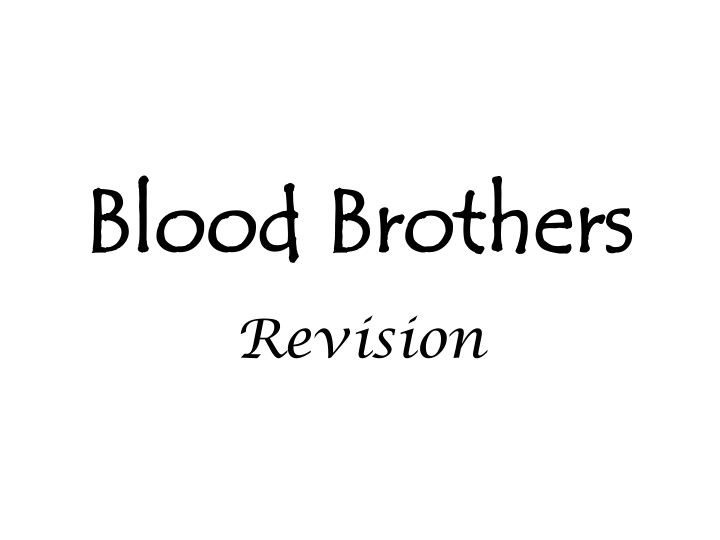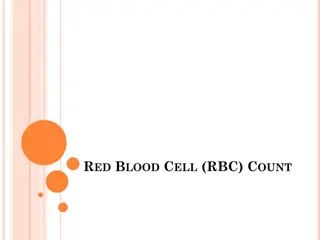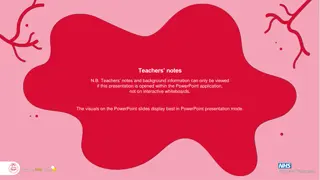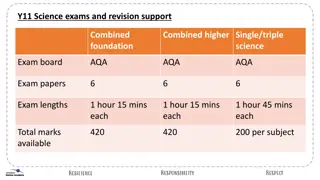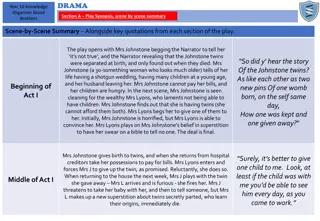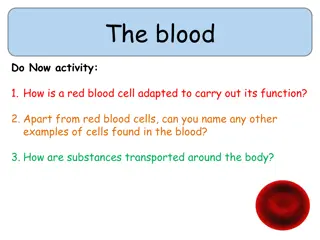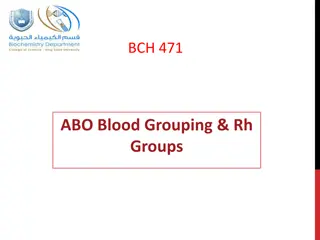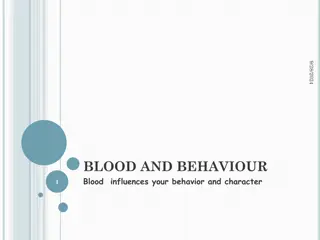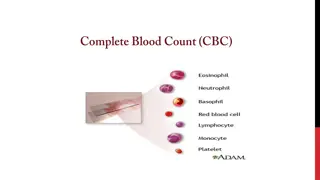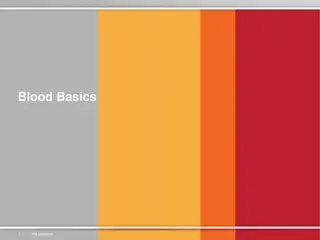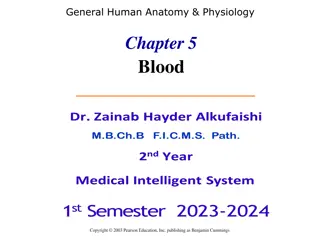Blood Brothers Revision Questions and Answers
Explore a series of questions related to the play "Blood Brothers," covering themes, character backgrounds, plot details, and key moments. Test your knowledge of this dramatic narrative and see how well you remember the story and its characters.
Download Presentation

Please find below an Image/Link to download the presentation.
The content on the website is provided AS IS for your information and personal use only. It may not be sold, licensed, or shared on other websites without obtaining consent from the author.If you encounter any issues during the download, it is possible that the publisher has removed the file from their server.
You are allowed to download the files provided on this website for personal or commercial use, subject to the condition that they are used lawfully. All files are the property of their respective owners.
The content on the website is provided AS IS for your information and personal use only. It may not be sold, licensed, or shared on other websites without obtaining consent from the author.
E N D
Presentation Transcript
Blood Brothers Blood Brothers Revision
Question 1 Who does Mrs Johnston look like when she s younger? 1. Pamela Anderson 2. Jennifer Anniston 3. Marilyn Monroe 4. Marilyn Manson
Question 2 How many children does Mrs Johnston have before the twins are born? 1. 5 2. 6 3. 7 4. 8
Question 3 Bonus question! Complete the following narrator s speech: So did y hear the story of the ______ _____ As like each other as two ______ ________
Question 4 Why does Mickey claim he takes his pills? 1. To make him invisible 2. To make him feel numb 3. To give him a rush 4. To stay up all night
Question 5 How long is Mickey s initial jail sentence? 1. 2 years 2. 3 years 3. 5 years 4. 7 years
Question 6 What two things does the narrator blame for the tragic ending? 1. Superstition and class 2. Superstition and Mrs Johnstone 3. Class and Mrs Lyons 4. Mickey and Edward
Question 7 How did Linda get Mickey a job? 1. She went to the job centre 2. She knew someone through her brother 3. She asked Mrs Johnstone to help her 4. She went to Eddie for help
Question 8 Why does the Lyons family move house? 1. Mr Lyons is relocated due to work 2. Eddie is closer to his private school 3. Mrs Lyons wants to move away from the Johnstone family 4. They want a bigger house
Question 9 Why does Mickey kill Edward? 1. He thinks Linda and Edward are having an affair 2. He hates Edward 3. He wants to punish Mrs Lyons 4. He thought it was a game
Question 10 Why does Mrs Johnstone tell the boys that they are twins? 1. She doesn t believe the superstition 2. She thinks it will calm Mickey down 3. Mrs Lyons tells her to 4. She wants to see if the superstition is true
A theme is an idea that a writer A theme is an idea that a writer wants you to think about. wants you to think about. Examples of different themes could include: Love Death War Social Class Family Jealousy Bullying Guilt Superstition Which of these themes can be found in Blood Brothers ? What other themes can you think of? You must give examples.
Themes There are many themes used in 'Blood Brothers', the main ones being based on class and superstition.
Themes Class divide Family Growing up Superstition and Fate Hopes and Dreams Nature versus Nurture Love and Marriage
Social Class In this country, class effects how people are able to live their lives and the situations they are in. In 'Blood Brothers' Mrs Johnstone lives in a poor end of Liverpool, struggling to bring up eight children on her own and is forced to give one away to keep the others clothed and fed well enough, whereas Mrs Lyons, whom she works for, lives in a large house, very comfortably in a nice part of Liverpool, she wants children but is unable to have any, even though she is rich, unlike Mrs Johnstone.
Love and Superstition Love is a theme, shown by the two women who love their sons but show it in completely different ways. Along with superstition, this is is the basis of the whole story and is a theme that continues throughout the whole play, the consequences of most of the happenings can be traced back to superstition. It is also the reason for the tragic end of the play.
Friendship There's also the theme of friendship, linked between Mickey, Eddie and Linda and how they are all friends, but it gradually brakes apart. Mickey and Linda's friendship develops into love Mickey and Eddie's friendship firstly breaks up when Eddie is forced to move away by his parents, then again later in the play when Mickey becomes depressed he begins to become jealous of Eddie, again leading up to the tragic consequences. Hate then becomes part of the play
Guilt Mrs Johnstone is comsumed with the theme of guilt through out most of the play because she gave her son Edward away to Mrs Lyons Mrs Lyons feels guilt because she has lied to everyone about Edward being her own son, she lied to her husband, friends, family and even Edward himself. Mickey also feels guilt because he is depressed and can t support his family (Linda and their child). He has to rely on Linda and Mrs J
Characters Mrs Lyons Mr Lyons Edward Lyons Mrs Johnstone Mickey Other children including Sammy and Donna-Marie Linda Narrator Chorus to play minor roles such as Miss Jones
Motifs Marilyn Monroe Guns- toy and real The idea of games Dancing
Techniques Parallel scenes to bring out class differences Use of key episodes to give a flavour of life, since play covers a long period of time Use of songs Use of motifs Narrator and chorus Flashback starts with final scene
Language The working class characters speak in Liverpool dialect, which makes them sound natural, warm and likeable. The middle class characters speak in Standard English, with Received Pronunciation this is the cause of humour when the boys first meet.
The role of the narrator Comments on the action Tells the story and involves the audience Links episodes together Warns of danger by appearing on stage at crucial times Points out themes Asks audience questions
What do the songs add to the Play? Link scenes and draw parallels Remind the audience of Key themes Link the two halves of the play by using some of the same words/ tunes, such as EasyTerms Mood and atmosphere Humour and pathos Fill in parts of the plot
The tragic outcome is inevitable from the very start. Discuss. Theme of Superstition and Fate Starting with final scene Continual warnings from the narrator The Marilyn Monroe motif The gun motif Nurture Johnstone family are in trouble from the start e.g. Sammy s behaviour and Mrs Johnstone s fears for Mickey Class divide
To what extent do you feel sympathy for Mrs Johnstone? At the start, very little: a stone in place of a heart , but gradually as story unfolds we feel much more: Husband walks out leaving her with little money Mrs Lyons pushes her into it She does it for the best She s a loving mother to all her children She stays cheerful and makes the best of things But do we also feel she could have controlled her children better, been harder on them?
What does this play have to say about class? The class divide is unfair Russell shows that two people with identical DNA can be so different in what they achieve because working class people were denied the chances to develop Russell poses the question: could it be what we, the English have come to know as class? Money can t buy love but it can buy power.
Now you try What mother/child relationships? has this play to say about How is the theme of love presented? You may consider family love, romantic love and married love. How far do you think Russell presents the working class characters in a more favourable light than the middle class characters? Can you think of any other questions?
